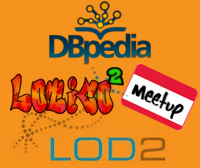
Session, THU 13:30 - 15:00
Visualization and User Experience
The user's discovery of the semantic jungle
Broad adaptation of the semantic web needs to be addressed by professionals in a way that is understandable for the non-professional. Part of the competence of engineers in this field is to create a high quality translation of available knowledge to be consumer ready and easily digestible.
In this presentation, I will discuss lessons learned from the highly abstract area of enterprise architecture and show some paths through the jungle of the semantic web, to lead the general user towards a richer experience of these technologies.
About
- ABIO BV is an educator and assessor in the information architecture field, experienced at explaining, facilitating and creating awareness of highly abstract concepts.
- The complexity of the information and knowledge Domain poses a number of challenges for authors, management and users alike.
- We are in a good position to advise you and your business to understand and gain from the Semantic Web and will guide you as a data publisher (organizations, government, cultural heritage organizations, local businesses) to make better use of the Web as a data platform.
- Education and support is needed and we will help you with this.
Marleen Olde Hartmann
Marleen Olde Hartmann studied andragology and worked in the field of education between business and IT. She is specialized in the knowledge and skills of professionals and an objective representation of personal competence. Change management, enterprise and information architecture are recent areas of focus of ontology driven semantics of the web. She works from her own company ABIO BV since 2000, educating and assessing people, teams and organizations in the field of enterprise modeling. ABIO has recently teamed up with PoolParty.
Sketch-based Ontology Authoring Interfaces for Non-Experts in Knowledge Modelling
Ontologies are powerful means to formalize knowledge. But – due to the complexity of current tools – understanding and applying this technology is very hard for novices in knowledge modeling. Therefore novices often fall back to pen and paper – especially when making sense of their domain. We try to reduce the complexity of the user interface to a minimum and apply interaction techniques well-known from the handling of pen and paper.
We focus on how non-experts in knowledge modelling can use and understand ontologies. Therefore we analyze their workflows in respect to sensemaking and knowledge modelling. Based on this insight we are developing visual authoring systems.
Last year we introduced a sketch-based interaction concept named OntoSketch, enabling non-experts to create and extend formally represented knowledge. Contrary to current editors, our tool is based on lightweight pen and paper-like interactions, including a visual vocabulary that supports non-experts in modeling knowledge of specific domain information.
We will report on our first experiences with our prototype in use: Non-experts in knowledge modelling are able to use the powerful possibilities provided by ontologies without having to understand the concept in detail using this tool. We further started using it for teaching students in semantic technologies. We will report about the results in our talk.
Marius Brade
Marius Brade currently works as a Research Fellow at the Chair of Media Design, Department of Computer Science at Technische Universität Dresden in Germany. He is currently finishing his PhD as a specific co-operation between industry and academia focusing on interaction design. The title of his thesis is: Interactive Visualization Methods for Structuring Information in the Context of Sensemaking and Knowledge Modeling. Before starting his doctoral study, Marius obtained a Diploma in Media Computer Science from the Technische Universität Dresden (2009). Next to his studies Marius attended several courses at the Academy of Fine Arts in Dresden. During his studies he developed a deep interest in how people think and memorize information.
Semantically Faceted Navigation with Topic Pies
Faceted search allows navigating through large collections along different dimensions in order to find relevant objects efficiently. Traditional faceted search systems often suffer from a lack of usability; furthermore facets are often static and independent from the search result set.
In this paper, we present a dynamic semantic topical faceting approach. A pie menue called “topic pie” is used for visualization of facets and user interaction. Depending on the search query, the topic pie presents a set of topics and major topics which help the user to drill down the search result set to relevant objects as well as to browse exploratively through the collection. The underlying algorithm optimises the conflicting goals of relevance and diversity while avoiding information overload. It reveals a good performance on large data sets. As our use-case we chose literature research in scientific libraries. An evaluation shows major advantages of our approach compared to state-of-the-art faceted search techniques in library portals.
Tilman Deuschel, Christian Greppmeier, Bernhard Humm and Wolfgang Stille
University of Applied Sciences Darmstadt, Germany
POSTER:
iGraph: Intelligent Enterprise Information Logistics
Engineers in the automotive domain are confronted with a huge load of information making it difficult for them to identify the information relevant for performing their tasks. Particularly challenging is the alignment of process information, such as offices files, checklists, and guidelines with business processes. In previous work, we introduced the concept of process-oriented information logistics (POIL) enabling the intelligent delivery of process information along business processes. In this paper, we present iGraph, an application implementing POIL. Specifically, iGraph demonstrates how engineers can be supported with relevant process information during the review of product requirements.
Bernd Michelberger, Bela Mutschler, Daniel Binder, Jan Meurer and Markus Hipp
University of Applied Sciences Ravensburg-Weingarten, Daimler AG





